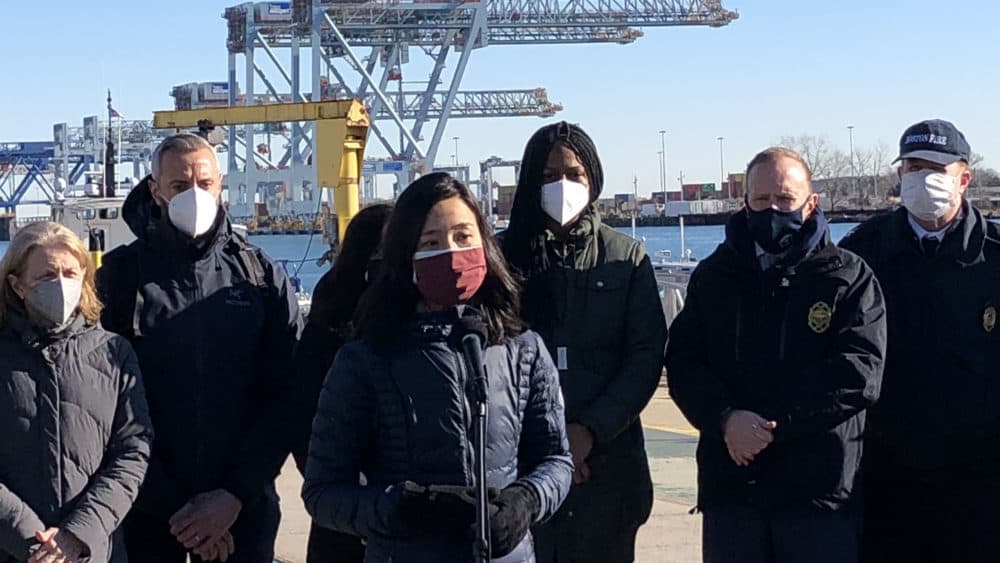Advertisement
Wu visits Long Island as possible help for tent encampment

Boston Mayor Michelle Wu is considering how to bring social service programs to Long Island as a way to help deal with homeless tent encampment at Massachusetts Avenue and Melnea Cass Boulevard.
The island was once home to several addiction and mental health treatment programs — and the city's largest homeless shelter — until its bridge was deemed unsafe and closed more than seven years ago.
Flanked by several administration members, Wu on Tuesday toured the island's 400,000 square feet of vacant city-owned building space that might be used to help deal with the hundreds of people living in the tent encampment at "Mass and Cass."
"The condition of many of the buildings is quite dilapidated," Wu said speaking to reporters on the waterfront after the 11-minute ferry ride from the island. "We saw water damage in basically every space we were in. There's kind of a range of buildings where the heating systems were still functional and many where they were not."
The visit to the island, Wu said, is part of an audit of all city buildings to identify space to house and provide services to those living in the encampment. Long Island would become part of a longer-term plan that is still "months or years" away, Wu said.
In the shorter term, Wu said she's weighing options to clear the tents and their occupants by Jan. 12. She said the city is expected to create new transitional housing for 150 people living in the encampment by next week.
"As we are working very quickly on the urgent crisis at 'Mass. and Cass' with actions that will continue to ramp up next week and beyond, we are already evaluating medium and long term options," Wu said. "Long Island is one big piece of that."
Wu said she did not have details about when the island's buildings might be useable or how much renovations might cost, but her administration plans to meet with city and nonprofit leaders to talk further.
One big potential obstacle is how to get to the island. On Tuesday, Wu said that all options of transportation to the island are under consideration, including ferry service.
Former Mayor Marty Walsh had proposed a new bridge to the island from the city of Quincy. That plan that is still the subject of litigation from Quincy officials. Their main argument is the new proposed bridge is similarly designed to the former bridge and does not meet current environmental standards.
Advertisement
A spokesman for Quincy mayor Thomas Koch said Quincy officials have not yet met with the Wu administration about the bridge, but they are willing to work with Boston, so long as the city's plans don't include a bridge through Quincy.
"Our issues have never been about the use of the island," said Christopher Walker, chief of staff for Quincy Mayor Koch. "We felt from day one that something could be discussed and worked out, and that uses of the island could see there potential utilized via water transportation."
Many say the closing the bridge to Long Island in 2014 led to today's issues at Mass. Ave. and Melnea Cass Boulevard. Hundreds of people living on the island were bused to makeshift shelters and other programs in Boston. The city created the Southampton Street Shelter a short time later, which is currently at the center of the densest part of the encampment.
On Tuesday, there were still roughly two dozen tents along Atkinson Street. Some residents there expressed skepticism about Wu's plans to clear the tents by next week. Several said they have not heard about the city's transitional housing options and they don't plan to leave by next week.
A 42-year-old man who goes by the name "Midnight" said he's been living in the encampment for three years. On a day when the temperature hovered around 30 degrees, Midnight admitted that a tent isn't exactly a comfortable place to live during a New England winter, but he said he stays for the community that's been created in the encampment.
"I'm not advocating that this is where we reside," Midnight said. "There's no running water and it is living in the tent, with everything that you can imagine living in a tent. But I'm going to stay here because I've known a lot of these people for a long time and we are part of the same struggle of surviving. When you go through some hardships with some individuals, you begin to lean towards them because they understand what you're going through."
